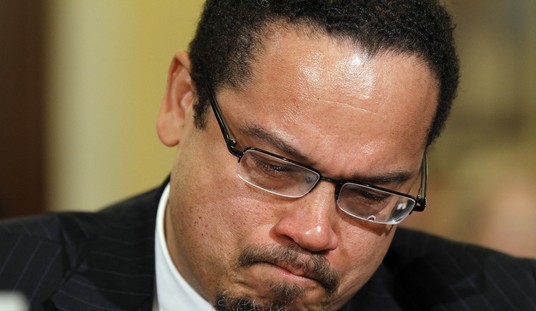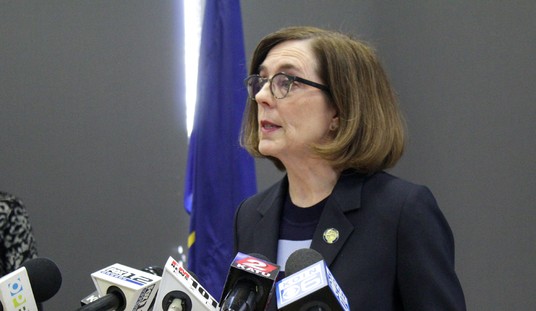Pundits have talked for weeks about the possibilities for a brokered convention after having seen one of the more volatile nominating contests in memory. Neither party has had a brokered convention for 50 years, however, and it’s not because we haven’t had competitive primaries in that time. Usually, voters tend to hit a tipping point and start getting behind a leading candidate, which effectively ends the competitive phase of a nomination fight and puts the party on a glide path to a unifying convention in the late summer. That point gets reached when one candidate simply starts winning often enough to make the outcome clear.
That may be starting to happen now, if Gallup’s latest poll is an indication. Mitt Romney has jumped to his largest national lead in weeks as Super Tuesday arrives:
Mitt Romney leads Rick Santorum by 16 percentage points in Feb. 29-March 4 Gallup Daily tracking of national Republican registered voters’ preferences for their party’s nomination. Romney is at 38%, Santorum 22%, Newt Gingrich 15%, and Ron Paul 12%. Santorum led Romney by 10 points as recently as Feb. 20.
Romney’s current 38% of the vote is the highest percentage any candidate has obtained since Gallup Daily tracking of the race began on Dec. 1, and comes in the wake of Romney’s wins in the Feb. 28 Michigan and Arizona primaries. Romney won the Washington state GOP nonbinding caucuses on Saturday, but that victory would have had only a limited impact on the latest five-day rolling national average, which extends back through last Wednesday.
The March 6 slate of 10 primaries and caucuses in the so-called Super Tuesday states has the potential to once more alter the national standings of the candidates. Romney is widely expected to lose in Gingrich’s home state of Georgia, and faces a tough challenge in Tennessee and Oklahoma. Romney is likely to win in his home state of Massachusetts and the contiguous state of Vermont. The critical state will be Ohio, partly because pre-election polling shows the race there to be very close and partly because it is considered to be a bellwether state that will be important in this fall’s election.
Romney’s strong momentum nationally in recent days suggests that he may do better than expected in the 10 Super Tuesday states.
In my column for The Week, I warn that both Rick Santorum and Newt Gingrich have narrow windows of opportunity to prevent that tipping point from being reached today:
The Super Tuesday schedule also favors Romney. He should get an overwhelming victory in Massachusetts, his home state, where no other candidate has seriously competed for the 41 delegates. The same is true with Vermont and its 17 delegates. Virginia should have been competitive, but neither Newt Gingrich nor Santorum qualified for the ballot in the Old Dominion, and a majority-vote win over Ron Paul would allow Romney to claim all 49 delegates. That gives Romney a big springboard toward winning a majority of the delegates at stake today. …
Santorum has a better opportunity to slow Romney down and extend the race. Oklahoma has 43 delegates up for grabs, and Santorum has a big lead in the polls — although no surveys have been conducted since the Arizona debate. If Santorum can maintain that big lead in Oklahoma, he can get a significant haul of delegates. But if Romney can ride the Sunday endorsement of Sen. Tom Coburn to a boost in the state, that delegate allocation could become a wash. In Tennessee, Santorum still has a small edge and could get a majority of the state’s 58 delegates.Of course, Oklahoma isn’t really the critical state for Santorum. He needs to win Ohio, a middle-America, Rust Belt state where Santorum’s emphasis on blue-collar economics should find the most resonance. Like Michigan, Santorum ran up big polling leads in Ohio in mid-February, only to lose them as the actual primary contest approached. Polling in the last 48 hours shows Ohio as a toss-up. A narrow win won’t help Santorum outside of the psychological edge, either, as his organizational difficulties last year left him unable to compete for as many as 18 of the state’s 66 delegates. Depending on which congressional districts he wins and loses, a small popular-vote win statewide for Santorum might still result in Romney winning a significantly larger number of delegates.
Most eyes will stay on the results in Ohio and Tennessee tonight. If Santorum can hang on and win both those states, he will still trail Romney in delegates (and possibly Gingrich as well), but will convince donors to keep funding his campaign as the best alternative to Romney. If Romney edges Santorum in either state — but especially Ohio — Santorum has a difficult sale to make on his continued presence in the race. Primary campaigns usually hit a tipping point where Republican voters and donors begin to flock to an undisputed leader in order to bring the fight to a quick conclusion. If Santorum can’t keep Romney from claiming to be that undisputed leader on Super Tuesday, he may exhaust the patience of both groups.
I’m on assignment today and tomorrow and won’t do much blogging in my normal slots. However, I will be on the Hugh Hewitt show tonight as returns come in, and I will be blogging tonight as well to help Allahpundit on analyzing the results.








Join the conversation as a VIP Member